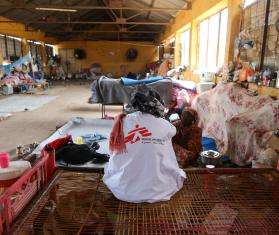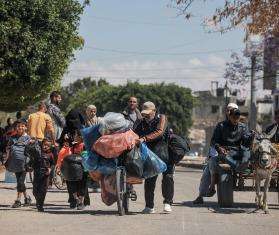New York, September 3, 2020—In response to the first confirmed COVID-19 case in Moria refugee camp on the island of Lesbos, the Greek government is enforcing a potentially harmful quarantine on all migrants and asylum seekers in the camp. This type of mass quarantine is dangerous and must be avoided at all costs, the international medical humanitarian organization Doctors Without Borders/Médecins Sans Frontières (MSF) said today.
“[There is no] justification for the enforced mass quarantine,” said Caroline Willemen, MSF field coordinator for COVID-19 on Lesbos. “In a place that’s so overcrowded, it means nobody can keep social distance and there is not enough water and sanitation facilities for people to wash their hands on a regular basis. What’s worse, we know these measures will worsen our patients’ already deteriorating mental health.”
These restrictive measures are being implemented as an attempt to cover up a lack of comprehensive strategy to reduce transmission in the camp and protect the 13,000 people squeezed into a space designed to host 3,000, said MSF.
“What is happening is that COVID-19 is being used as an excuse to limit the freedom and rights of people who are seeking safety,” said Willemen. “A proper public health response is what is needed, with contact-tracing as well as testing, a serious boost to hygiene conditions, and healthcare services that are easily accessible. The local health authorities have started testing the residents of the camp for COVID-19, but that is a fraction of what needs to be done.”
At the end of July, MSF was forced to close its COVID-19 isolation center on Lesbos after local authorities imposed fines with potential criminal charges related to urban planning regulations—a decision by the Greek Government that significantly reduced the COVID-19 response capacity on the island.
The number of COVID-19 confirmed cases among non-migrant residents of the island has risen recently, but so far there is only one confirmed case of COVID-19 among residents of Moria camp. The Greek government must require local health officials to implement a comprehensive public health response for the asylum seekers in Moria—not to imprison them in horrific conditions under the pretense of protecting the island from the spread of the virus.
Moria is not a safe place for anyone, but there are more than 200 identified individuals whose age and underlying health conditions put them at even greater risk if they contract COVID-19. For months MSF and other actors have called for the complete evacuation of the residents of Moria camp, with a specific urgency to move these particularly vulnerable people to safe accommodation on Lesbos, the Greek mainland, or other states in the European Union. In April, the Greek government promised to evacuate vulnerable people from the islands, but five months later, they are still trapped—now, by a police cordon.
“Right now in Moria there are elderly people with underlying health conditions, pregnant women, as well as children who are afraid and are being exposed to more trauma as a result of this policy,” said Willemen. "The government should be protecting these people, but instead, by keeping them hemmed in with COVID in the camp, they are exposing them.”
With the first positive COVID-19 case confirmed in Moria, it is essential that Greek authorities move people from the camp to safe accommodation now. Not doing so is a clear neglect of their duty of care.
As a medical organization with almost 50 years of experience, MSF knows that a comprehensive public health approach is needed now, rather than quarantine—especially as COVID-19 is already spreading outside of the camp. Greek Authorities must not resort to damaging measures such as policing and detention. Instead, they should:
- Ensure the community receives proper information about the virus and how they can protect themselves;
- collaborate with the community;
- ensure basic hygiene measures are accessible and possible for everyone;
- evacuate and protect people who are at heightened medical risk;
- undertake mass testing;
- isolate and treat positive COVID-19 cases;
- contact trace;
- and enforce quarantine only in places where minimum hygiene standards are in place and where medical follow-up can be ensured.
If the Greek government is going to protect people in Moria and slow or prevent the spread of COVID-19, it must urgently implement these public health measures, or entirely evacuate the 13,000 people stranded in Moria to safer places. Relying solely on testing and mass quarantine will inevitably cause additional suffering and bring no public health benefits to anyone.




